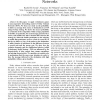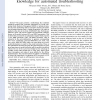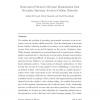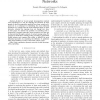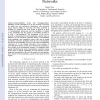143
Voted
WIOPT
2010
IEEE
14 years 11 months ago
2010
IEEE
Abstract—We consider the problem of jointly optimizing random access and subgraph selection in coded wireless packet networks. As opposed to the corresponding scheduling approach...
105
Voted
WIOPT
2010
IEEE
14 years 11 months ago
2010
IEEE
—In this paper we study the influence of using hub nodes to relay messages in human-based delay tolerant networks (DTNs), by analyzing empirical traces obtained by human mobilit...
103
Voted
WIOPT
2010
IEEE
14 years 11 months ago
2010
IEEE
—In this paper, we apply evolutionary games to non-cooperative forwarding control of Delay Tolerant Networks (DTN). We focus our study on the probability to deliver a message fro...
96
Voted
WIOPT
2010
IEEE
14 years 11 months ago
2010
IEEE
—The paper presents a methodology that combines statistical learning with constraint optimization by locally optimizing Radio Resource Management (RRM) or system parameters of po...
107
Voted
WIOPT
2010
IEEE
14 years 11 months ago
2010
IEEE
—It has been shown that the well-known cutset bounds can be achieved for deterministic wireless networks by performing random coding at each intermediate node. The complexity and...
112
Voted
WIOPT
2010
IEEE
14 years 11 months ago
2010
IEEE
We consider the problem of providing opportunistic spectrum access to secondary users in wireless cellular networks. From the standpoint of spectrum license holders, achieving ben...
89
Voted
WIOPT
2010
IEEE
14 years 11 months ago
2010
IEEE
—K-shell (or k-core) graph decomposition methods were introduced as a tool for studying the structure of large graphs. K-shell decomposition methods have been recently proposed [...
143
Voted
WIOPT
2010
IEEE
14 years 11 months ago
2010
IEEE
Abstract—Delay-reliability (D-R), and throughput-delayreliability (T-D-R) tradeoffs in an ad hoc network are derived for single hop and multi-hop transmission with automatic repe...
88
Voted
WIOPT
2010
IEEE
14 years 11 months ago
2010
IEEE
Abstract—Nowadays energy saving and reduction of electromagnetic pollution become important issues. One approach to
108
Voted
WIOPT
2010
IEEE
14 years 11 months ago
2010
IEEE
—Complex networks can often be divided in dense sub-networks called communities. Using a partition edit distance, we study how three community detection algorithms transform thei...

